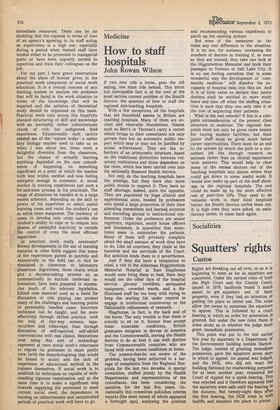Medicine
How to staff hospitals
John Rowan Wilson
If two men ride a horse, goes the old saying, one must ride behind. This bitter but inescapable fact is at the root of the most serious current problem of the Health Service: the question of how to staff the regional non-teaching hospitals.
With a few exceptions, all the hospitals that are household names in Britain are teaching hospitals. Many of them are ancient and venerable foundations. Names such as Bart's or Thomas's carry a cachet which brings to their consultants not only private fees but an automatic public respect which may or may not be justified by actual achievement. They are the inheritors of an aristocratic structure, based on the traditional distinction between voluntary institutions and those dependent on the rates, which has been carried over into the nationally financed Health Service.
Not only do the teaching hospitals have the prestige, but they have also more public money to support it. They have no staff shortage. indeed, quite the opposite. They are populoted by huge clinical and experimental units, headed by professors who spend a large proportion of their time attending committees and learned societies and travelling abroad to instructional conferences. Under the professors are senior registrars, registrars, senior house officers and housemen, in quantities that sometimes seem to outnumber the patients. Many of them will privately complain about the small amount of work they have to do. Like all courtiers, they chafe at the boredom and the servitude of the Court. But ambition binds them to it nevertheless.
And if they did have a temptation to rebel, a vist to the Alderman Higginbottom Memorial Hospital at East Slagthorpe would soon bring them to heel. Here they would see the other face of the hospital service: gloomy corridors, antiquated equipment, crowded wards, and a disillusioned staff far too busy with trying to keep the waiting list under control to engage in intellectual controversy or the fashionable refinements of research.
Slagthorpe, in fact, is the back end of the horse. The only trouble is that there is nobody to sit on it. Sooner than accept these miserable conditions, British graduates emigrate in droves to America and the Commonwealth, leaving the Health Service to do as best it can with doctors from Commonwealth countries who are faced with even worse conditions at home.
The powers-that-be are aware of the problem, having been subjected to a barrage of complaints from the Regional Hospitals for the last two decades. A special committee, staffed jointly by the Health Departments and representatives of the consultants, has been considering the question for the last five years. Occasionally this committee publishes interim reports (the most recent of which appeared a fortnight ago), analysing the position and recommending various expedients to patch up the existing system.
But none of the measures so far make any real difference to the situation. It is no use, for instance, increasing the numbers of doctors in training if, as soon as they are trained, they take one look at the Higginbottom Memorial and book their passages to Toronto or Salt Lake City. It is no use fooling ourselves that in some wonderful way the development of 'community medicine' will dissolve the occupants of hospital beds into thin air. And it is of little value to declare that junior doctors shall be entitled to more study leave and time off when the staffing situation is such that they can only take it at the cost of neglecting their patients.
What is the real remedy? It lies in a complete reconsideration of the present class structure in medicine. The regional hospitals must not only be given more money for buying modern facilities, but their junior staff must be given much better career opportunities. There must be an end to the system by which the path to a consultant job lies through research on animals rather than on clinical experience with patients. This would help to clear some of the excess doctors out •of the ieaching hospitals into places where they could get down to some useful work. It would also make up part of the staff shortage in the regional hospitals. The rest could be made up by the more effective use of part-time GPs. They used to do valuable work in their local hospitals before the Health Service turfed them out. It is high time they were asked, on satisfactory terms, to come back again.






































 Previous page
Previous page